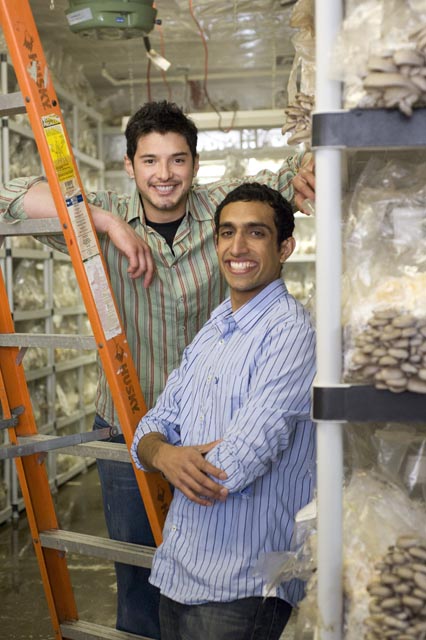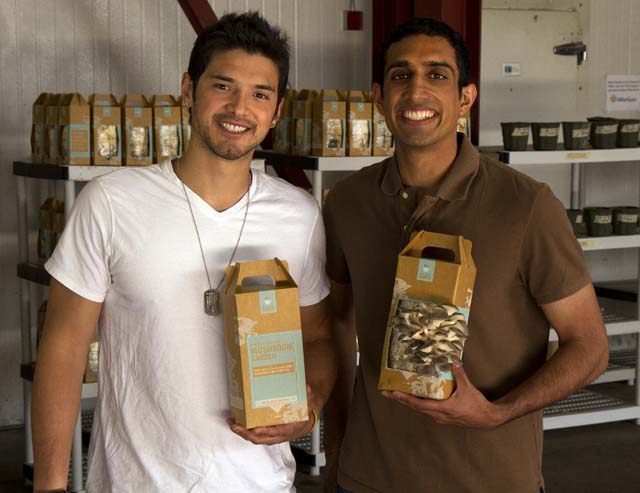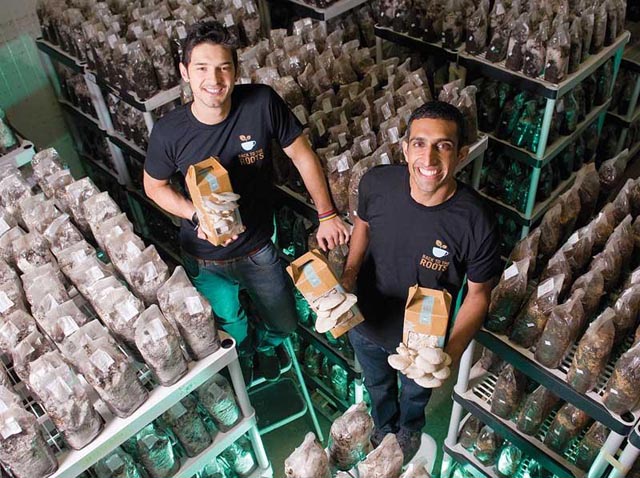
Roaring Twenties: This is the second in a series on people in their 20′s whose impact has been felt in fields ranging from medicine to finance to the non-profit world. What makes them tick, what gets them through rough times and what are their dreams for the future?
Back to Roots: Recycling One Million pounds of used coffee grounds
Imagine growing gourmet oyster mushrooms from discarded coffee grounds!
Nikhil Arora and Alejandro Velez , both students at UC Berkeley, were headed toward careers in investment banking and consultancy when they heard a professor talk about this little known fact. Intrigued they decided to put it to the test.
“The whole idea seemed so improbable – it’s really been a blast!,” says Nikhil. “We had no background in food or agricultural farming but we really hit it off. We were both passionate about the idea of turning waste into food.”
They ended up turning Alex’s frat kitchen into their experimental lab. Before going on vacation, they planted mushrooms in recycled coffee grounds in 10 test buckets. When they returned, nine were totally contaminated but one had these absolutely beautiful mushrooms. The chef at Chez Panisse gave them a big thumbs up. After they perfected the process, the well-known chain of Whole Foods bought from them and the university chancellor gave them $5000 for their entrepreneurial venture. The two decided, “Forget banking and full time mushroom farming it is!”

Agents of Change at the White House
The gambit has succeeded beyond their wildest dreams. This idea of producing local fresh food from urban waste has resulted in the reuse of 1 million pounds of used coffee grounds which would have been dumped in landfills. They have been invited to the White House as agents of change.
Their company Back to the Roots now sells Grow your Own Mushroom Garden kits to over 300 Whole Foods nationwide. Once the mushrooms have been harvested, that used soil is so rich in nutrients that it is further distributed to urban schools and community gardens to enrich their food production.
Nikhil explains that gourmet mushrooms normally are grown in expensive oak chips, sawdust or hardwoods and using discarded coffee grounds work as well, and these are picked up free from the cafes. “Why cut down on your national resources when millions of pounds of waste works biologically as well?” asks Nikhil.
“In growing mushrooms, the biggest energy use is actually sterilization of the soil. But coffee is brewed in boiling hot water so that’s already sterilized and we can piggyback on the cafe’s energy use. This cool combination saves energy, resources and creates local and urban jobs in the city.”
The Mushroom kits have proved a hit because they can be grown at home within ten days by anyone, even children.. “It shows how much value there is in things. They can grow in any conditions, be it a desert or Alaska,” says Nikhil who hopes to inspire everyone to grow their own food. His family is originally from Punjab but now living in Southern California. He says his mother is excited about the mushrooms and is constantly incorporating them in the Indian meals at home. In fact, the Back to Roots website now features many mushroom recipes, including some Indian ones.

Mushroom Gardens for Schools
Both Nikhil and Alex love being mushroom farmers and initiating change. In a recent promotion on Facebook, they asked people who had bought their mushroom kits to send a photo of their harvest in order to get a free kit for the elementary school of their choice to grow. They were inundated with hundreds of pictures, and really enjoyed sending out the kits for kids to grow their own mushrooms.
“Every time I talk about it I have a big smile on my face,” says Nikhil who likes the fact that the soil can further be used for neighborhood gardens to grow flowers, tomatoes and cucumbers. “The coolest thing about this is that the left over mushroom roots with the coffee grounds make for really rich organic fertilizer. Waste of waste still has value – so it’s a zero waste product!”
Indeed, if this waste had been dumped into a landfill, it would have decomposed to produce tons of methane gas in the atmosphere. Instead, the large coffee company Peets actually pays them for carting the used coffee grounds! The mushroom kits are now selling in Canada and Hong Kong too, and Nikhil would one day like to introduce them in India, where there is so much interest in growing one’s own food.
As the White House Business Council report noted, “As Back to the Roots spreads from coast to coast, they continue to promote sustainability, healthy communities and green development, inspiring people to grow food at home. Nikhil and Alejandro began their journey growing mushrooms in the dark. In creating a viable and successful business, they have the opportunity to help bring the issues that matter to them – and some delicious food – to light.”
While basking in the accolades, Nikhil describes a typical day. They begin the morning at 5 am. driving around collecting 40,000 waste a week from local cafes, stopping at 30 to 40 cafes every day to collect the discarded coffee grounds. He says with a laugh, “At the end of the day, at our foundation and core we are trash collectors!” To that one can add, also environmental superheroes!
(C) Lavina Melwani
(This article first appeared in Hi Blitz)
Related Articles:
Thinking Out of the Box

5 Comments
Via LinkedIn
Suparna Gupta
WOW…there is hope for the planet!! Awesome invention!
Michael Szlatchetk
I really love what you guys are doing. I make compost for my own garden and I use coffee grounds, egg shells and banana peals. Sustainable solutions to create a interesting product!
Susanta Pattnayak
Bravo! Superb – great idea! Keep this up … Keep bringing many more ideas up …Keep thinking out of box… for the benefit of all of us, our world and our environment!!
Via LinkedIn
Charlene Sullivan Tallen
I absolutely love this idea! What great minds these men have. Genius. There is so much that is thrown into the trash that can be used again. Earlier generations produced far less trash because they were frugal and in many cases, as during WW2, things were rationed. More of this please!
Tabish Ayubi
Bravo…!!!
Dennis Willman
While the total impact of one small operation like this is very small, if it succeeds others will be encouraged to act. Instead of 1,000 Points of Light, how about 1,000 Bricks in the Wall. Let this be the 1st.
Via Linkedin
Jasmine Ding
Great thinking. This kind of projects should get green investment to expand the application
Balakrishna Gopinath
Great job Great young men !
Rogers Rugendo
Wish can join your league!
So glad you enjoyed the article! You will get all the information on how to grow the mushrooms at http://www.backtotheroots.com
Very Very Great Job. Thanks.
Can I Get The Guide to Harvest the Mushrooms at Home?